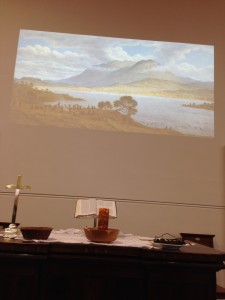2014 Refugee week launch – Tasmania solution is alternative to offshore processing
Tasmania’s Anglican Bishop John Harrower, Alderman Damon Thomas, and the CEO of the Multicultural Council of Tasmania, Ms Anna Reynolds, launched 2014 Refugee Week today, by calling for Tasmania to be seriously considered by Canberra as an alternative to offshore processing.
Their call follows an event on Thursday, where Anglican Bishop Harrower and CEO of the Australian Churches Refugee Taskforce, Ms Misha Coleman, were overwhelmed with interest from local, state and Federal MPs to the proposition that Tasmania could process asylum seekers in the community, instead of the billions of dollars being wasted on offshore detention facilities.
The Anglican Cathedral in Hobart was packed on Thursday evening with people who wanted to know more – including enlightened Tasmanian MPs.
The Anglican Bishop of Tasmania John Harrower, Patron of the Taskforce, said that “Tasmania can be the solution, and the bi-artisanship displayed tonight is reminiscent of the leadership displayed by Fraser and Whitlam when confronted with the prospect of hundreds of thousands of Vietnamese asylum seekers. In contrast we have a tiny number of people feeling persecution – Tasmania can deal with this and wants to deal with this”
Bishop Harrower said: “The Taskforce estimates it’s costing Australian taxpayers $3,744 per day for each man, woman and child held in offshore detention centres.”
He said the billions spent on offshore detention could not be justified when the Federal Government is cutting funding on health and education to the states.
“The Tasmanian Government estimates it will be $2.1 billion worse off over the next decade as a direct result of the Federal Budget. When contrasted with the $4.2 billion Canberra is planning to spend on offshore detention over the next four years, Tasmanians are entitled to question the Federal Government’s priorities.
Damon Thomas said that speaking personally “whilst clearly there are issues to be resolved and courage needed to take the issue further, clearly such a step would lead to the employment of Tasmanians in the thousands of jobs that could be created by processing asylum seekers in Tasmania”
“I believe that the City of Hobart could play an important role in this plan – we are already a Refugee Welcome Zone, but I need to engage with the Council to get support for it to broaden its current activity.
Other cities have refugee welcome ceremonies and community passports to assist people living on very limited resources. I am confident the people of Hobart would embrace increasing our initiatives in this area.” He said.
Multicultural Council CEO, Anna Reynolds said, there were estimated to be 10.4 million refugees under the care of the United Nations globally, with war and conflicts being the main reasons people are driven to leave their homelands.
“Of this vast number, just 2,000 refugees came to Tasmania during the five years from 2008 to 2013, as part of the national humanitarian program. Tasmania’s numbers are a tiny fraction of the 76,000 refugees that settled in Australia – which is in itself a small number compared to the global refugee challenge.”
“In Tasmania we are a world away from the chaos of war. While we may not understand a journey driven by fear, we can celebrate our ability to be a haven for asylum seekers.”
“Tasmania’s economy would benefit from an injection of new residents. Refugees, like migrants generally, bring labour, skills and they increase the overall demand for goods and services. “
The attached diagram (please click here) shows some of the key differences between the islands of Tasmania, Nauru and Manus.
Contact: The Rev’d Stephen Carnaby, Bishop’s Media Officer, 0417 343 710,
Damon Thomas, 0419 355 115, Anna Reynolds, 0423 222 149
(Media Release of 15th June)
See also: Manus spend or Tassie spend?

